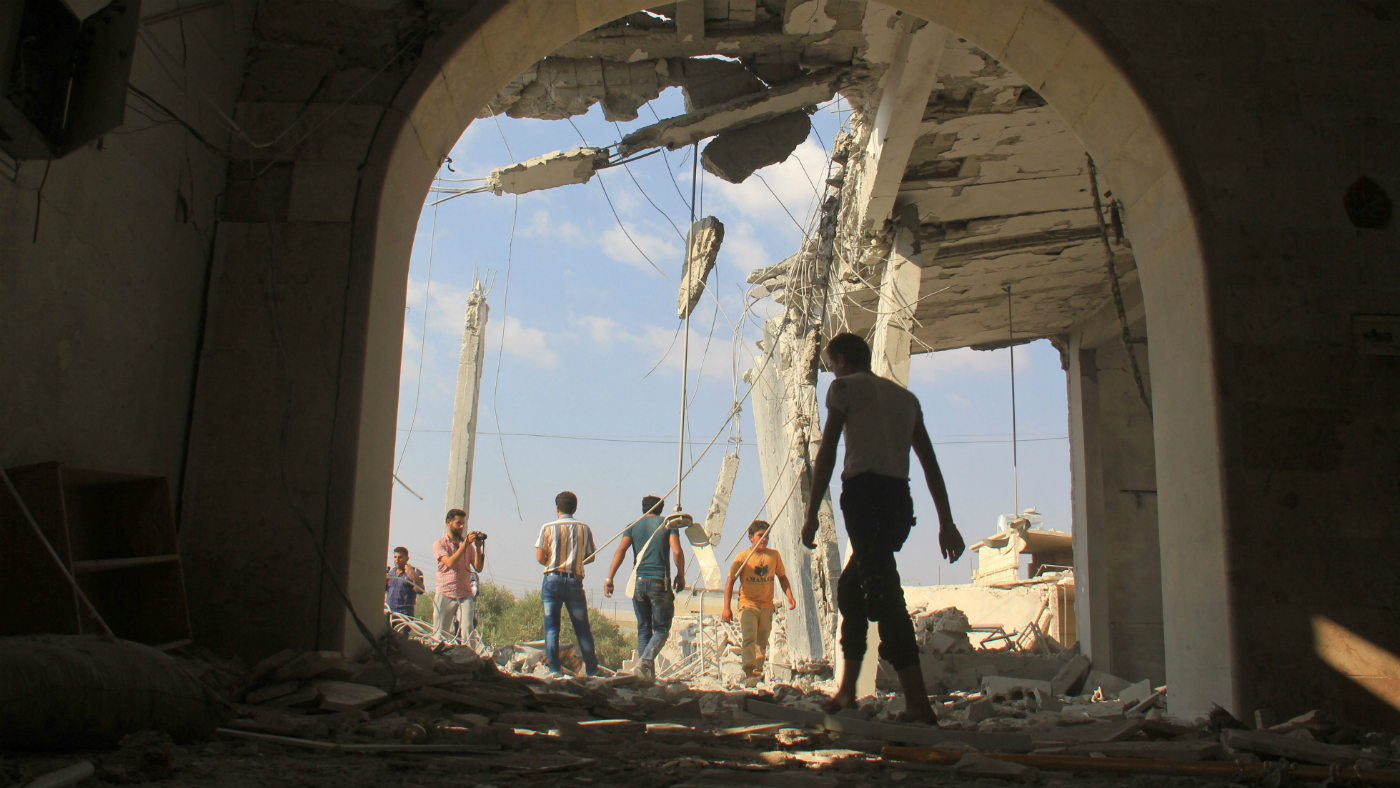Why the UK is halting foreign aid to rebel-held areas of Syria
The decision suggests Britain has accepted that the Syrian opposition faces imminent defeat

A free daily email with the biggest news stories of the day – and the best features from TheWeek.com
You are now subscribed
Your newsletter sign-up was successful
The government has decided to axe the funding of a number of aid programmes in rebel-held areas of Syria on the basis that it’s become too difficult to deliver the money.
Funding for the Free Syrian Police, a controversial community-led police force set up after the Syrian uprising in 2011, is expected to be scrapped next month.
Meanwhile, funding for local councils is under review and is likely be terminated by the end of the financial year, according to The Times.
The Week
Escape your echo chamber. Get the facts behind the news, plus analysis from multiple perspectives.

Sign up for The Week's Free Newsletters
From our morning news briefing to a weekly Good News Newsletter, get the best of The Week delivered directly to your inbox.
From our morning news briefing to a weekly Good News Newsletter, get the best of The Week delivered directly to your inbox.
The symbolic move acknowledges that the seven-year revolution is “effectively over”, the paper says.
Why has funding been axed?
Britain has been financially supporting rebel-held areas of Syria since 2012, pumping in millions of pounds worth of humanitarian aid, as well as funding the Free Syrian Police and some local councils.
But the UK government now says the non-humanitarian programmes are “too risky to operate” as the final rebel-held areas face “imminent attack” from President Bashar al-Assad’s forces, The Guardian reports.
A free daily email with the biggest news stories of the day – and the best features from TheWeek.com
The decision suggests Britain has accepted that the Syrian opposition is facing looming defeat from a combination of Syrian regime forces and Russian airstrikes, the paper adds.
A government spokesperson said: “As the situation on the ground in some regions has become increasingly difficult, we have reduced support for some of our non-humanitarian programming.”
The Foreign Office and the Department for International Development have denied that the decision is linked to a BBC Panorama investigation broadcast in December, which alleged that the Free Syrian Police force was cooperating with extremists in northwestern Syria.
What about humanitarian aid?
Britain has spent £152m on humanitarian programmes in Syria during 2017-2018 and remains one of the largest aid donors to the war-torn nation.
Today’s announcement is not expected to affect vital humanitarian support, such as the provision of food, water and medical treatment. The government has announced it will continue to deliver “vital support” to help those most in need, and to improve security and stability in the country.
Last week, Minister for the Middle East Alistair Burt announced new measures to assist civilians in the region, including support for four health centres and early warning air raid sirens.
“The UK is extremely concerned about escalating military action by Assad and his backers on almost three million civilians who have sought shelter in Idlib and surrounding areas,” he said.
-
 The environmental cost of GLP-1s
The environmental cost of GLP-1sThe explainer Producing the drugs is a dirty process
-
 Greenland’s capital becomes ground zero for the country’s diplomatic straits
Greenland’s capital becomes ground zero for the country’s diplomatic straitsIN THE SPOTLIGHT A flurry of new consular activity in Nuuk shows how important Greenland has become to Europeans’ anxiety about American imperialism
-
 ‘This is something that happens all too often’
‘This is something that happens all too often’Instant Opinion Opinion, comment and editorials of the day
-
 Epstein files topple law CEO, roil UK government
Epstein files topple law CEO, roil UK governmentSpeed Read Peter Mandelson, Britain’s former ambassador to the US, is caught up in the scandal
-
 Iran and US prepare to meet after skirmishes
Iran and US prepare to meet after skirmishesSpeed Read The incident comes amid heightened tensions in the Middle East
-
 Syria’s Kurds: abandoned by their US ally
Syria’s Kurds: abandoned by their US allyTalking Point Ahmed al-Sharaa’s lightning offensive against Syrian Kurdistan belies his promise to respect the country’s ethnic minorities
-
 Israel retrieves final hostage’s body from Gaza
Israel retrieves final hostage’s body from GazaSpeed Read The 24-year-old police officer was killed during the initial Hamas attack
-
 China’s Xi targets top general in growing purge
China’s Xi targets top general in growing purgeSpeed Read Zhang Youxia is being investigated over ‘grave violations’ of the law
-
 Syria’s Islamic State problem
Syria’s Islamic State problemIn The Spotlight Fragile security in prison camps leads to escape of IS fighters
-
 Panama and Canada are negotiating over a crucial copper mine
Panama and Canada are negotiating over a crucial copper mineIn the Spotlight Panama is set to make a final decision on the mine this summer
-
 Why Greenland’s natural resources are nearly impossible to mine
Why Greenland’s natural resources are nearly impossible to mineThe Explainer The country’s natural landscape makes the task extremely difficult